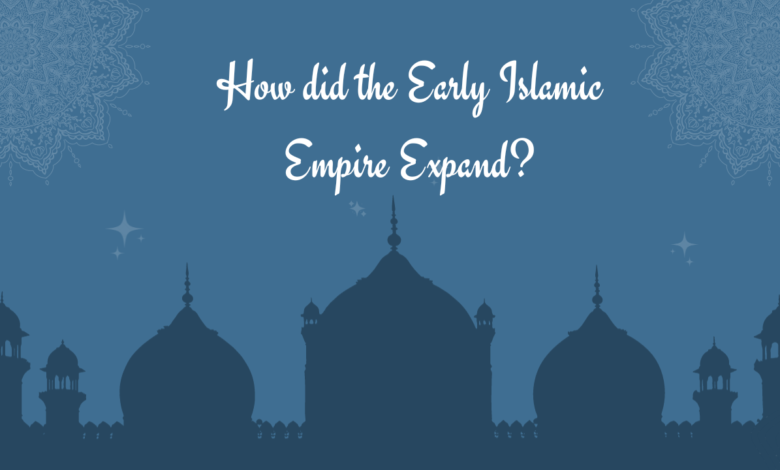How did the Early Islamic Empire Expand?
Exploring the Dynamics of Islamic Expansion

How did the Early Islamic Empire Expand?
The Early Islamic Empire refers to the expansion of Islamic territories and influence in the years following the death of the Prophet Muhammad. It includes the Rashidun Caliphate and the subsequent Umayyad Caliphate.

Introduction
The early Islamic Empire, often referred to as the Rashidun and Umayyad Caliphates, was a remarkable period in history when the Islamic faith and Arab culture began to spread across vast territories. This expansion was driven by a combination of factors, including military conquests, diplomacy, trade, and cultural influence. In this article, we will delve into the key mechanisms that facilitated the rapid expansion of the early Islamic Empire.
The Military Conquests
One of the most significant factors contributing to the expansion of the early Islamic Empire was its military prowess. Under the leadership of the four rightly guided caliphs (Rashidun) – Abu Bakr, Umar ibn al-Khattab, Uthman ibn Affan, and Ali ibn Abi Talib – and the subsequent Umayyad Caliphs, the Islamic armies embarked on a series of successful military campaigns.
The Ridda Wars: After the death of the Prophet Muhammad in 632 CE, some Arabian tribes rebelled against Islamic rule. The caliphate, under the leadership of Abu Bakr, launched the Ridda Wars to re-establish control. This marked the first military expansion of the early Islamic Empire.
The Conquest of Persia: Under Caliph Umar, the Islamic forces defeated the mighty Sassanian Empire in 642 CE, capturing key cities like Ctesiphon and expanding their territory into modern-day Iran.
The Conquest of Byzantine Territories: The Islamic armies, led by General Khalid ibn al-Walid, conquered large parts of the Byzantine Empire, including Syria, Palestine, and Egypt, in the 7th century.
The Expansion into North Africa: During the reign of the Umayyad Caliphs, Islamic forces pushed westward into North Africa, capturing territories in present-day Tunisia, Libya, and parts of Morocco.
The Conquest of Spain: Perhaps one of the most notable expansions was the conquest of Spain, led by Tariq ibn Ziyad in 711 CE. The Umayyad Caliphate established Al-Andalus, a Muslim territory that would endure for centuries.
Also check.
- Who is the Wessiah in Islam?
- What is Wudu in Islam?
- What is Jihad in Islam?
- Why did Islam Spread So Quickly?
- What are the Holy Books of Islam?
Diplomacy and Tolerance
While military conquests played a significant role, diplomacy and tolerance were also instrumental in the expansion of the Islamic Empire. Islamic rulers often displayed a remarkable degree of religious tolerance, allowing conquered peoples to retain their beliefs and customs in exchange for loyalty and a poll tax (jizya). This policy encouraged peaceful assimilation and minimized resistance in newly conquered regions.
Trade and Economic Expansion
The Islamic Empire’s expansion was not limited to military and political realms; it also flourished economically. The development of an extensive network of trade routes, such as the Silk Road and Indian Ocean trade routes, allowed for the exchange of goods, ideas, and cultures. Major cities like Baghdad and Cairo became thriving hubs of commerce and scholarship, attracting merchants and intellectuals from across the known world. This economic prosperity further solidified the empire’s influence.
Administrative Efficiency
To govern the vast territories they had conquered, the early Islamic rulers implemented a highly efficient administrative system. They utilized local administrators and allowed regions a degree of autonomy as long as they remained loyal to the caliphate. This approach reduced the need for a large occupying force and helped maintain stability.
Cultural and Intellectual Influence
The Islamic Empire was not solely defined by its military and political achievements. It also made significant contributions to art, science, philosophy, and culture. The translation movement in places like Baghdad saw the translation of Greek, Roman, and Indian texts into Arabic, preserving and expanding upon ancient knowledge. Scholars like Ibn Sina, al-Razi, and Ibn Rushd made groundbreaking advancements in various fields, further enhancing the prestige and influence of the empire.
Conclusion
The expansion of the early Islamic Empire was a multifaceted process, driven by a combination of military conquests, diplomacy, trade, administrative efficiency, and cultural influence. This period marked a transformative era in world history, shaping the course of civilizations and leaving a lasting legacy that continues to influence the modern world.

FAQs
What was the Early Islamic Empire?
The Early Islamic Empire refers to the expansion of Islamic territories and influence in the years following the death of the Prophet Muhammad. It includes the Rashidun Caliphate and the subsequent Umayyad Caliphate.
What role did military conquests play in the expansion of the Early Islamic Empire?
Military conquests were a significant factor in the expansion of the Islamic Empire. Islamic armies engaged in successful campaigns across various regions, including Persia, Byzantine territories, North Africa, and Spain.
Were there diplomatic efforts involved in the expansion of the Islamic Empire?
Yes, diplomacy played a role in expansion. Islamic rulers often practiced religious tolerance and allowed conquered peoples to retain their beliefs in exchange for loyalty and a poll tax, which helped in peacefully assimilating new territories.
How did trade contribute to the expansion of the Islamic Empire?
Trade routes like the Silk Road and Indian Ocean trade facilitated the exchange of goods, culture, and ideas. Major Islamic cities like Baghdad and Cairo became economic hubs, attracting merchants and scholars.
What made the administrative system of the Early Islamic Empire efficient?
The empire’s administration relied on local administrators and granted regions a degree of autonomy, provided they remained loyal. This approach reduced the need for large occupying forces and contributed to stability.
What cultural and intellectual contributions did the Islamic Empire make during its expansion?
The Islamic Empire made significant contributions to art, science, philosophy, and culture. The translation movement in cities like Baghdad preserved and expanded upon knowledge from various civilizations.
How did the Islamic Empire’s expansion influence the course of history?
The Islamic Empire’s expansion played a transformative role in world history, shaping the development of civilizations and leaving a lasting legacy that continues to impact the modern world.
Were there any key figures associated with the expansion of the Islamic Empire?
Yes, key figures include the four rightly guided caliphs (Abu Bakr, Umar, Uthman, and Ali), General Khalid ibn al-Walid, and others who played pivotal roles in the empire’s military and political expansion.
What was the lasting impact of the Early Islamic Empire’s expansion on global history and culture?
The expansion of the Islamic Empire had a profound and lasting impact on global history, influencing art, science, philosophy, architecture, and various aspects of culture in the regions it touched.
Are there any modern parallels to the expansion of the Early Islamic Empire?
While historical circumstances differ, some scholars draw parallels between the expansion of the Islamic Empire and modern geopolitical dynamics, emphasizing the role of diplomacy, trade, and cultural exchange in shaping global affairs.




